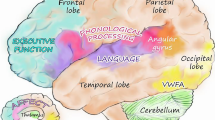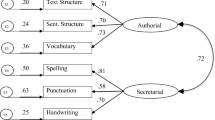Abstract
Reading is assumed to play an important role in the development of literate persons in that it is consciousness-altering activity. The manner by which reading contributes to development is unclear, however, and has been debated by social scientists for some years. Despite the importance of reading in adult life, only recently have researchers devoted significant attention to what and how well adults read. Less scrutiny has been directed toward understanding what sorts of benefits may be gained from reading in adult life and how reading contributes to adult development. This paper describes adults' reading practices across a variety of social contexts, the types of skills employed in these practices, and how reading may contribute to adult cognitive development. Implications deriving from a better understanding of adult reading practices and skills across the life span are discussed.
Similar content being viewed by others
References
Anderson, T. H., & Armbruster, B. (1984). Studying. In P. D. Pearson (Eds.),Handbook of reading research (Vol. 1). New York: Longman.
Baker, L. (1990). Metacognition, comprehension monitoring, and the adult reader.Educational Psychology Review, 1, 3–38.
Barton, P. E., & Kirsch, I. S. (1990).Workplace competencies: The need to improve literacy and employment readiness. Washington, DC: U.S. Department of Education.
Beach, R., & Hynds, S. (Eds.). (1991).Developing discourse practices in adulthood. Norwood, NJ: Ablex.
Bogart, L. (1992). The state of the industry. In P. S. Cook, D. Gomery, & L. W. Lichty (Eds.),The future of news: Television-newspapers-wire services-newsmagazines (pp. 85–103). Washington, DC: The Woodrow Wilson Center Press.
Book Industry Study Group. (1984).The 1983 consumer research study on reading and book purchasing. New York: Book Industry Group.
Buswell, G. T. (1937).How adults read (Supplementary Educational Monographs, No. 45). Chicago: University of Chicago Press.
Carnevale, A. P., Gainer, L. J., Meltzer, A. S., & Holland, S. L. (1988). Workplace basics: The skills employers want.Training and Development Journal, 20–30.
Carver, R. (1985). How good are some of the world's best readers?Reading Research Quarterly, 20, 389–419.
Check, J. F., & Toellner, S. (1984). Reading patterns of adults.Reading Improvement, 21, 82–88.
Clausen, J. A. (1981). Men's occupational careers in the middle years. In D. H. Eichorn, J. A. Clausen, N. Haan, M. Honzik, & P. Mussen (Eds.),Present and past in middle life. New York: Academic Press.
Czentimihalyi, M. (1990). Literacy and intrinsic motivation.Daedalus, 119, 115–140.
Das, J. P., & Dash, U. N. (1989). Schooling, literacy, and cognitive development: A study in rural India. In C. K. Leong & B. S. Randhawa (Eds.),Understanding literacy and cognition: Theory, research, and application (pp. 217–244). New York: Plenum Press.
Diehl, W., & Mikulecky, L. (1981). Literacy demands and occupational levels.Adult Literacy and Basic Education, 3–4, 226–238.
Duncan, P. H., & Goggin, W. F. (1981, December).Reading habits, patterns, and interests of older adult readers. Paper presented at the annual meeting of the American Reading Forum, Sarasota, FL. (ERIC Document No. 209-654).
Easton, D. K. (1947, December). What does America read?Bulletin of the National Association of Secondary School Principals, 31, 108–117.
Fisher, J. (1986). Literacy usage among older adults. In K. Landers (Ed.),Proceedings for the annual Adult Education Research Conference (pp. 94–99). Syracuse, NY. (ERIC Document No. 269-571).
Gallup, G. (1937). I asked 100,000 people what they read in newspapers.Advertising and Selling, 31, 41–43.
Garner, R. (1993). “Seductive details” and adults' learning from text. In S. R. Yussen & M. C. Smith (Eds.),Reading across the life span (pp. 215–222). New York: Springer-Verlag.
Goody, J., & Watt, I. (1968). The consequences of literacy. In J. Goody (Ed.),Literacy in traditional societies (pp. 27–68). London: Cambridge University Press.
Gould, R. (1978).Transformations: Growth and change in adult life. New York: Simon & Schuster.
Graff, H. J. (1979).The literacy myth. New York: Academic Press.
Gray, W.S. (1956). How well do adults read? In N. B. Henry (Ed.),Adult reading: Fifty-fifth yearbook of the National Society for the Study of Education, Part II (pp. 29–56). Chicago: University of Chicago Press.
Guthrie, J., & Greaney, V. (1991). Literacy acts. In R. Barr, M. Kamil, P. Mosenthal, & P. D. Pearson (Eds.),Handbook of reading (Vol. 2, pp. 68–96). New York: Longman.
Guthrie, J. T., & Seifert, M. (1983). Profiles of reading activity in a community.Journal of Reading, 27, 498–508.
Guthrie, J. T., Seifert, M., & Kirsch, I. S. (1986). Effects of education, occupation, and setting on reading practices.American Educational Research Journal, 23, 151–160.
Guthrie, J. T., & Kirsch, I. S. (1987). Distinctions between reading comprehension and locating information in text.Journal of Educational Psychology, 79, 220–227.
Havighurst, R. J. (1972).Developmental tasks and education (3rd ed.). New York: D. McKay.
Heath, S. B. (1983).Ways with words: Language, life, and work in communities and classrooms. Cambridge, England: Cambridge University Press.
Higginson, B. C. (1990, April).Assessing the learning and study strategies of nontraditional college students. Paper presented at the annual meeting of the American Educational Research Association, Boston.
Hogan, T. P., & Hendrickson, E. H. (1984). The study habits of adult college students.Lifelong Learning, 8, 7–10, 26–28.
Hutson, B. A. (1987). Literacy at school and literacy at work. In D. Bloome (Ed.),Literacy and schooling (pp. 225–257). Norwood, NJ: Ablex.
Iowa Literacy Council. (1991, January).Reflections: Thoughts of delegates to the First Iowa Adult Literacy Congress. Des Moines: Iowa Department of Education.
Johnston, W. B., & Packer, A. E. (1987).Workforce 2000. Indianapolis, IN: Hudson Institute.
Kirsch, I. S., & Guthrie, J. T. (1984). Adult reading practices for work and leisure.Adult Education Quarterly, 34, 213–232.
Kirsch, I. S., & Jungeblut, A. (1986).Literacy: Profiles of America's young adults, Final Report (Report No. 16-PL-01). Princeton, NJ: National Assessment of Educational Progress.
Kirsch, I. S., Jungeblut, A., Jenkins, L., & Kolstad, A. (1993).Adult literacy in America: A first look at the results of the National Adult Literacy Survey. Princeton, NJ: Educational Testing Service.
Kirsch, I. S., Mosenthal, P. B., & Rock, D. A. (1988).The influence of reading patterns on the proficiencies of young adults. Unpublished manuscript, Educational Testing Service, Princeton, NJ.
Kohn, M. L. (1980). Job complexity and adult personality. In N. J. Smelser & E. H. Erikson (Eds.),Themes of work and love in adulthood (pp. 193–210). Cambridge, MA: Harvard University Press.
Levinson, D. (1978).The seasons of a man's life. New York: Knopf.
Lundeberg, M. (1987). Metacognitive aspects of reading comprehension: Studying understanding in legal case analysis.Reading Research Quarterly, 22, 407–432.
Lorge, I., & Blau, R. (1941). Reading comprehension of adults.Teachers College Record, 43, 189–198.
Luria, A. R. (1976).Cognitive development: Its cultural and social foundations. Cambridge, MA: Harvard University Press.
McEvoy, G. F., & Vincent, C. S. (1980). Who reads and why?Journal of Communication, 30, 134–140.
Meyers, B. J. F., Young, C. J., & Bartlett, B. J. (1988).Memory improved: Reading and memory enhancement across the life span through the use of strategic text structures. Hillsdale, NJ: Erlbaum.
Mikulecky, L. (1982). Job literacy: The relationship between school preparation and workplace actuality.Reading Research Quarterly, 17, 400–419.
Mikulecky, L. (1991). Basic literacy skills in the workplace. In R. Barr, M. L. Kamil, P. Mosenthal, & P.D. Pearson (Eds.),Handbook of reading research (Vol. 2, pp. 669–689). New York: Longman.
Mikulecky, L., & Ehlinger, J. (1983). The influence of metacognitive aspects of literacy on job performance of electronics technicians.Journal of Reading Behavior, 18, 41–62.
Mikulecky, L., Shanklin, N. L., & Caverly, D. C. (1979).Adult reading habits, attitudes, and motivations: A cross-sectional study. (Monographs in teaching and learning, No. 2). Bloomington: Indiana University Press.
Nell, V. (1988). The psychology of reading for pleasure: Needs and gratifications.Reading Research Quarterly, 23, 6–50.
Ngandu, K. M., & O'Rourke, B. (1980, November).Reading attitudes, habits, interests, and motivations of the elderly. Paper presented at the annual meeting of the College Reading Association, Boston.
Nickerson, R. S. (1986). Literacy and cognitive development. In M. E. Wrolstad & D. F. Fisher (Eds.),Toward a new understanding of adult literacy (pp. 5–38). New York: Praeger.
Northcutt, N. (1975).Adult performance level project: Adult functional competency: A report to the Office of Education dissemination review panel. Austin: University of Texas, Division of Extension.
Olson, D. R. (1986). The consequences of literacy.Canadian Psychology, 27, 109–121.
Ong, W. J. (1982).Orality and literacy. London: Methuen.
Oxenham, J. (1980).Literacy: Writing, reading, and social organisation. London: Routledge & Kegan Paul.
Parsons, R. B. (1923).A study of adult reading. Unpublished master's thesis, University of Chicago.
Pressley, M., Beard El-Dinary, P., & Brown, R. (1992). Skilled and not-so-skilled reading: Good information processing and not-so-good information processing. In M. Pressley, K. R. Harris, & J. T. Guthrie (Eds.),Promoting academic competence and literacy in schools (pp. 91–127). New York: Academic.
Reder, S. (1994). Practice engagement theory: A sociocultural approach to literacy across languages and cultures. In B. M. Ferdman, R. M. Weber, & A. G. Ramirez (Eds.),Literacy across languages and cultures. Albany, NY: SUNY-Albany Press.
Rice, G. E. (1983). The everyday activities of adults: Implications for prose recall—Part I.Educational Gerontology, 12, 173–186.
Scales, A. M., & Biggs, S. A. (1987). Reading habits of elderly adults: Implications for instruction.Educational Gerontology, 13, 521–532.
Scardamalia, M., & Bereiter, C. (1991). Literate expertise. In K. A. Ericsson & J. Smith, (Eds.),Toward a general theory of expertise: Prospects and limits (pp. 172–194). New York: Cambridge University Press.
Scribner, S., & Cole, M. (1981a).The psychology of literacy. Cambridge, MA: Harvard University Press.
Scribner, S., & Cole, M. (1981b). Unpackaging literacy. In M. F. Whiteman (Ed.),Writing: The nature, development and teaching of written communication. Vol. 1: Variation in writing: Functional and linguistic-cultural differences (pp. 71–87). Hillsdale, NJ: Erlbaum.
Sharon, A. T. (1973–74). What do adults read?Reading Research Quarterly, 9, 148–169.
Smith, J., & Baltes, P. B. (1990). A life-span perspective on thinking and problem-solving. In M. Schwebel, C. A. Maher, & N. S. Fagley (Eds.),Promoting cognitive growth over the life span. Hillsdale, NJ: Erlbaum.
Smith, M. C. (1988).A longitudinal study of the development of reading comprehension skills, cognitive monitoring skills, and reading attitudes: Childhood to adulthood. Unpublished doctoral dissertation, University of Wisconsin-Madison.
Smith, M. C. (1993). Change in reading ability and attitudes from childhood to adulthood: A life span perspective. In S. R. Yussen & M. C. Smith (Eds.),Reading across the life span (pp. 273–291). New York: Springer-Verlag.
Smith, M. C. (1996). Differences in adults' reading practices and literacy proficiencies.Reading Research Quarterly, 31, 196–219.
Smith, M. C., & Stahl, N. A. (1993, April).Adults' reading practices and activities: Age, educational, and occupational effects. Paper presented at the annual meeting of the American Educational Research Association. New Orleans.
Stamm, K. R., & Jacoubovitch, M. (1980). How much do they read in the daily newspaper: A measurement study.Journalism Quarterly, 57, 234–242.
Stanovich, K. E. (1993). Does reading make you smarter? Literacy and the development of verbal intelligence. In H. W. Reese (Ed.),Advances in child development and behavior (Vol. 24, pp. 133–180). New York: Academic Press.
Stanovich, K. E., & Cunningham, A.E. (1992). Studying the consequences of literacy within a literate society: The cognitive correlates of print exposure.Memory & Cognition, 20, 51–68.
Sticht, T. G. (1975).Reading for working: A functional literacy anthology. Alexandria, VA: Human Resources Research Association.
Wagner, D. (1992, October).Life-span and life-space literacy: Research and policy in national and international perspective. (Occasional Paper OP92-1) Philadelphia, PA: National Center on Adult Literacy.
West, R. F., Stanovich, K. E., & Mitchell, H. (1993). Reading in the real world and its correlates.Reading Research Quarterly, 28, 35–50.
Wilson, P. T., & Anderson, R. C. (1986). What they don't know will hurt them: The role of prior knowledge in comprehension. In J. Orasanu (Ed.),Reading comprehension: From research to practice. Hillsdale, NJ: Erlbaum.
Yankelovich, Skelly, & White, Inc. (1978).Consumer research study of reading and book purchasing. New York: Book Industry Study Group.
Yussen, S. R., & Smith, M. C. (1993).Reading across the life span. New York: Springer-Verlag.
Author information
Authors and Affiliations
Rights and permissions
About this article
Cite this article
Smith, M.C. Reading practices, reading skills, and cognitive growth in adulthood. J Adult Dev 2, 241–256 (1995). https://doi.org/10.1007/BF02251039
Issue Date:
DOI: https://doi.org/10.1007/BF02251039




